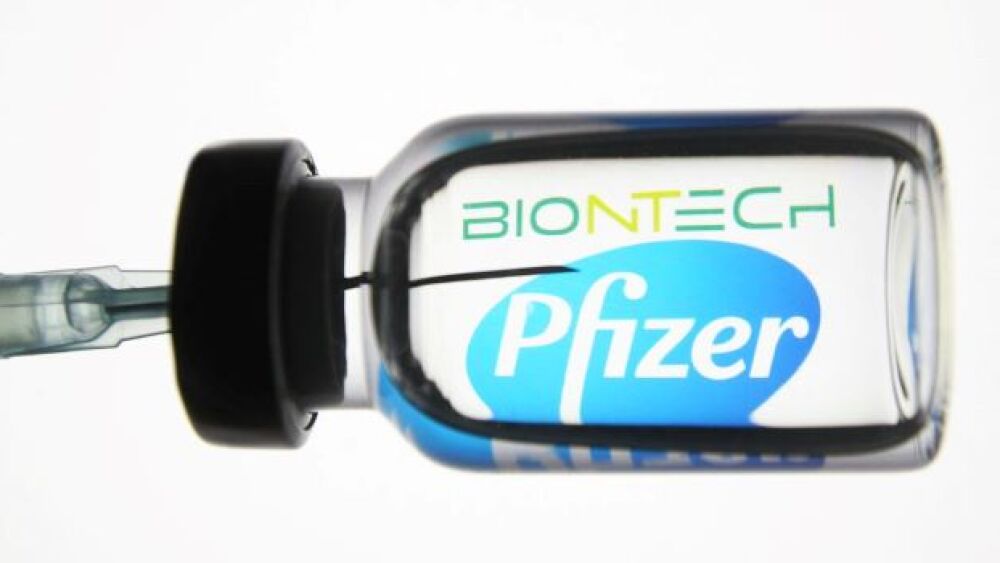The two companies announced data from a Phase III study which showed 100% efficacy and robust antibody responses in patients ages 12 -15 who received the BNT162b2 vaccine.
STR/NurPhoto via Getty Images
Pfizer and BioNTech’s COVID-19 vaccine could soon see authorization for use in adolescents under the age of 16. This morning, the two companies announced data from a Phase III study which showed 100% efficacy and robust antibody responses in patients ages 12 -15 who received the BNT162b2 vaccine.
The two companies said the topline results in the late-stage study of 1,160 adolescents exceeded the clinical data seen in patients aged 16 to 25. The companies plan to submit these data to the U.S. Food and Drug Administration and the European Medicines Agency for a requested amendment to the Emergency Use Authorization of BNT162b2 and the EU Conditional Marketing Authorization for COMIRNATY to expand use in adolescents 12-15 years of age as quickly as possible.
All participants in the trial will continue to be monitored for long-term protection and safety for an additional two years after their second dose.
Albert Bourla, chairman and chief executive officer of Pfizer, said the companies are encouraged by the results of the study and hope to begin vaccinating adolescents in this age group as quickly as possible in order to continue to curb the spread of COVID-19, particularly ahead of the 2021-2022 school year.
“Across the globe, we are longing for a normal life. This is especially true for our children. The initial results we have seen in the adolescent studies suggest that children are particularly well protected by vaccination, which is very encouraging given the trends we have seen in recent weeks regarding the spread of the B.1.1.7 UK variant. It is very important to enable them to get back to everyday school life and to meet friends and family while protecting them and their loved ones,” said Ugur Sahin, CEO and co-founder of BioNTech said in a statement.
In addition to the use of the vaccine in adolescents, Pfizer and BioNTech are also assessing the preventative medication in children ages six months to 11 years old.
Last week, the companies dosed the first healthy children in a seamless Phase I/II/III study evaluating the safety and efficacy of the vaccine in that age group. The study is evaluating the safety, tolerability, and immunogenicity of the Pfizer-BioNTech COVID-19 vaccine on a two-dose schedule (approximately 21 days apart) in three age groups: children aged 5 to 11 years, 2 to 5 years, and 6 months to 2 years. The 5 to 11 year-old cohort started dosing last week and the companies plan to initiate the 2 to 5 year-old cohort next week, the companies said.
AstraZeneca Woes Continue
As Pfizer and BioNTech plunge ahead with continued research on its vaccine, AstraZeneca continues to run into issues related to concerns over blood clots in some patients who received that company’s preventative medication. The German government halted use of the vaccine in patients under the age of 60. According to The Irish Times, Germany’s health authorities will make a decision by the end of April on how to proceed with people who are awaiting their second AstraZeneca jab.
In Germany, there have been 31 cases of blood clots that led to the suspension of its use. Of those cases, 19 were cases of thrombocytopenia, where a lower-than-normal level of blood platelets lead to symptoms including excessive nose bleeds. All but two cases involved women between 20 and 63. The two men affected were 36 and 57 years old, the Irish Times reported.
Variants Rise
Even as the companies rush forward with vaccines, there is a concern about the rise in variants of the novel coronavirus. The concern is these new variants will not be impacted by current therapeutics or the vaccines, particularly in places where mass vaccinations are not ongoing. Already, the U.S. government has suspended use of some monoclonal antibodies due to the lack of efficacy against some of the variants found in this country.
According to Axios, in a survey of 77 epidemiologists, about two-thirds said the world likely has a year or less before the virus changes so much that existing vaccines wouldn’t be effective against the new strains. Additionally, the virologists also speculated the vaccines already in use will have to be augmented by booster shots or new vaccines.
COVID-19 Origins
There is still some question over the origins of the novel coronavirus. While most researchers have suggested the virus jumped from animal to man, the idea that it may have escaped from a laboratory in China still lingers. World Health Organization Director General Tedros Adhanom Ghebreyesus said more research is needed before confirming the animal to man jump. In a recent report, the WHO said its access to fata during a recent trip to China was limited, particularly in relation to the question of whether or not the virus originated in a laboratory setting. Politico reported the U.S. government, along with more than a dozen others, have expressed concern about the WHO study, saying it was “significantly delayed” and lacked access to complete data.





